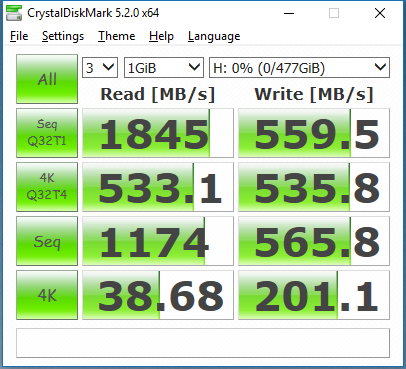CRYSTAL DISK BENCHMARK VER. 4.0.3 X64
Crystal Disk Benchmark is used to measure read and write performance through sampling of random data which is, for the most part, incompressible. Performance is virtually identical, regardless of data sample so we have included only that using random data samples.
Crystal Disk Mark’s results align well with the rated specs. Read speeds hit 1,845MB/s while write are just under 560MB/s. Here we also see that 4K performance is pretty good as well.
The toughest benchmark available for solid state drives is AS SSD as it relies solely on incompressible data samples when testing performance. For the most part, AS SSD tests can be considered the ‘worst case scenario’ in obtaining data transfer speeds and many enthusiasts like AS SSD for their needs. Transfer speeds are displayed on the left with IOPS results on the right.
AS SSD’s results are a bit lower than the other test results, but this is normal for us to see in testing. The 600P achieved an overall score of 1710points where it delivered 1.6GB/s read and 543MB/s write performance. At 4K QD1 its results were average and comparable to some of the best SATA drives out. Looking at the IOPS performance, we see that the Intel 600P achieved 128K/124K, which is very close to its rated 128K/128K ratings. Finally, the Copy test shows all speeds above SATA’s potential.
ANVIL STORAGE UTILITIES PROFESSIONAL
Anvil’s Storage Utilities (ASU) are the most complete test bed available for the solid state drive today. The benchmark displays test results for, not only throughput but also, IOPS and Disk Access Times. Not only does it have a preset SSD benchmark, but also, it has included such things as endurance testing and threaded I/O read, write and mixed tests, all of which are very simple to understand and use in our benchmark testing.
In Anvil Storage Utilities, we can see that the Intel 600P gave us an overall score of 7.5K points. This result is in between what we see with high-end SATA and other PCIe NVMe SSDs. Sequential and 4K speeds show to be similar to that of AS SSD and it reached 80K/130K IOPS read/write.
 The SSD Review The Worlds Dedicated SSD Education and Review Resource |
The SSD Review The Worlds Dedicated SSD Education and Review Resource | 


Passed my first test-At least 8K-IOPS-QD1.
Failed my second-Must write 200+ after buffer
can’t have it bottleneck my spinning rust.
Write speed shocked me for a 500 size drive
those speeds you expect on a 120 size drive.
And why the SLC cache so small???????
The ATTO results make sense as the 600p doesn’t have a controller that supports direct to die algorithm to relieve the bottle neck that occurs once the SLC cache is full. That being said very few program reads, go above 128K in windows. So, everything past that is just large file transfer, and really inconsequential in day to day compute performance outside of OS install.